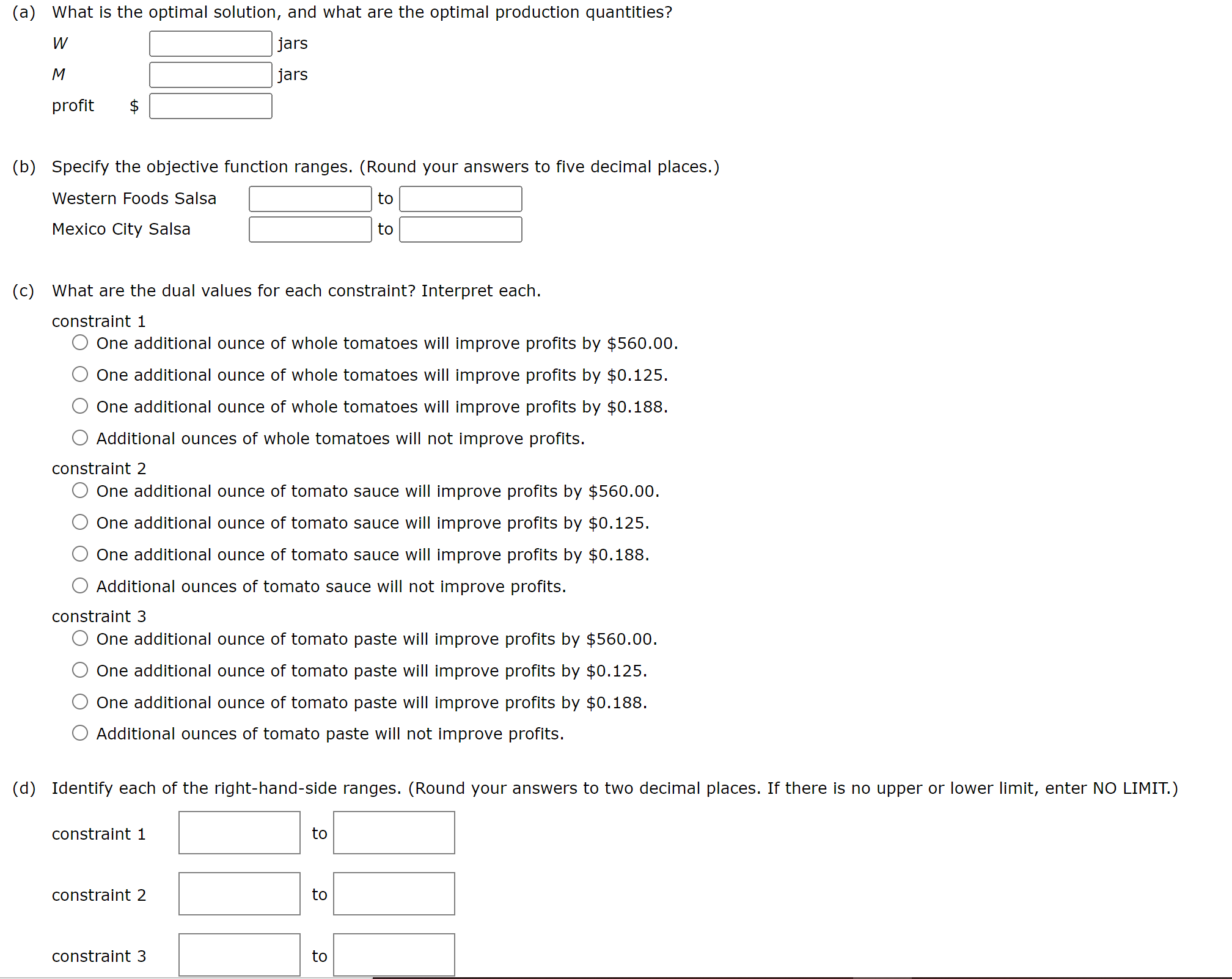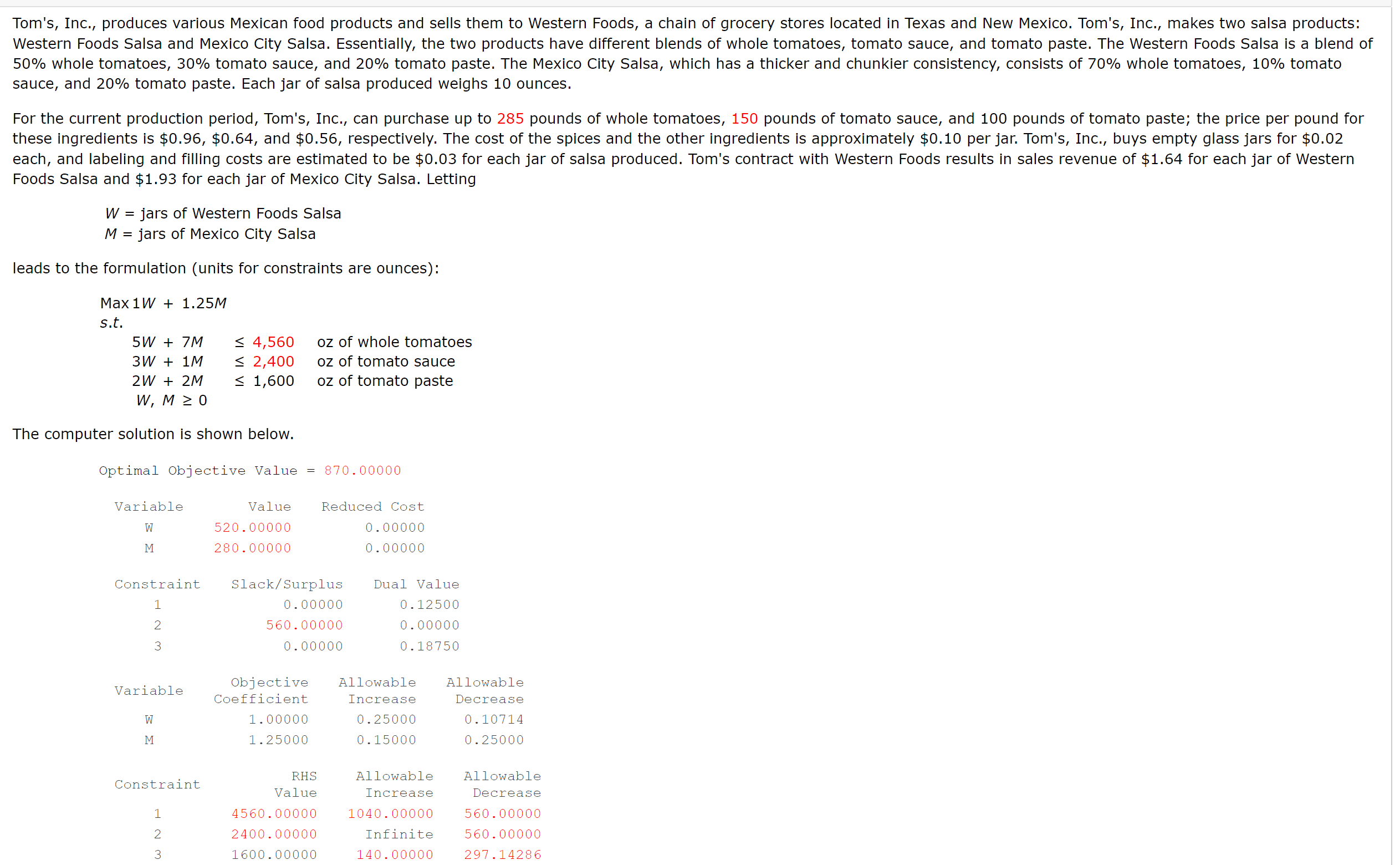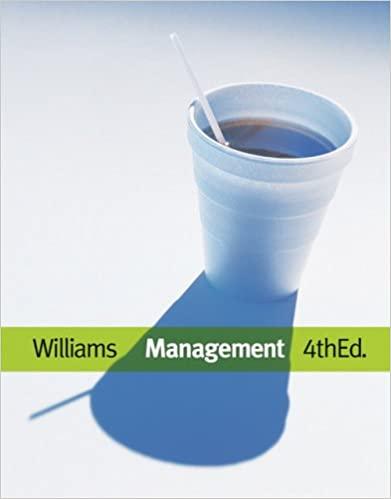Answered step by step
Verified Expert Solution
Question
1 Approved Answer
(a) What is the optimal solution, and what are the optimal production quantities? W M jars jars profit $ (b) Specify the objective function


(a) What is the optimal solution, and what are the optimal production quantities? W M jars jars profit $ (b) Specify the objective function ranges. (Round your answers to five decimal places.) Western Foods Salsa Mexico City Salsa to to (c) What are the dual values for each constraint? Interpret each. constraint 1 One additional ounce of whole tomatoes will improve profits by $560.00. One additional ounce of whole tomatoes will improve profits by $0.125. One additional ounce of whole tomatoes will improve profits by $0.188. Additional ounces of whole tomatoes will not improve profits. constraint 2 One additional ounce of tomato sauce will improve profits by $560.00. One additional ounce of tomato sauce will improve profits by $0.125. One additional ounce of tomato sauce will improve profits by $0.188. Additional ounces of tomato sauce will not improve profits. constraint 3 One additional ounce of tomato paste will improve profits by $560.00. One additional ounce of tomato paste will improve profits by $0.125. One additional ounce of tomato paste will improve profits by $0.188. Additional ounces of tomato paste will not improve profits. (d) Identify each of the right-hand-side ranges. (Round your answers to two decimal places. If there is no upper or lower limit, enter NO LIMIT.) constraint 1 to constraint 2 to constraint 3 to Tom's, Inc., produces various Mexican food products and sells them to Western Foods, a chain of grocery stores located in Texas and New Mexico. Tom's, Inc., makes two salsa products: Western Foods Salsa and Mexico City Salsa. Essentially, the two products have different blends of whole tomatoes, tomato sauce, and tomato paste. The Western Foods Salsa is a blend of 50% whole tomatoes, 30% tomato sauce, and 20% tomato paste. The Mexico City Salsa, which has a thicker and chunkier consistency, consists of 70% whole tomatoes, 10% tomato sauce, and 20% tomato paste. Each jar of salsa produced weighs 10 ounces. For the current production period, Tom's, Inc., can purchase up to 285 pounds of whole tomatoes, 150 pounds of tomato sauce, and 100 pounds of tomato paste; the price per pound for these ingredients is $0.96, $0.64, and $0.56, respectively. The cost of the spices and the other ingredients is approximately $0.10 per jar. Tom's, Inc., buys empty glass jars for $0.02 each, and labeling and filling costs are estimated to be $0.03 for each jar of salsa produced. Tom's contract with Western Foods results in sales revenue of $1.64 for each jar of Western Foods Salsa and $1.93 for each jar of Mexico City Salsa. Letting W = jars of Western Foods Salsa M = jars of Mexico City Salsa leads to the formulation (units for constraints are ounces): Max 1 W + 1.25M s.t. 5W + 7M 4,560 oz of whole tomatoes 3W + 1M 2,400 oz of tomato sauce 2W + 2M 1,600 oz of tomato paste W, M O The computer solution is shown below. Optimal Objective Value = 870.00000 Variable Variable Value W 520.00000 M 280.00000 Constraint Slack/Surplus 1 2 3 560.00000 0.00000 Objective Allowable Reduced Cost 0.00000 0.00000 Dual Value 0.00000 0.12500 0.00000 0.18750 Allowable Coefficient Increase W 1.00000 M 1.25000 0.25000 0.15000 Decrease 0.10714 0.25000 Constraint RHS Value 1 2 3 4560.00000 2400.00000 1600.00000 140.00000 Allowable Increase 1040.00000 Infinite Allowable Decrease 560.00000 560.00000 297.14286
Step by Step Solution
There are 3 Steps involved in it
Step: 1

Get Instant Access to Expert-Tailored Solutions
See step-by-step solutions with expert insights and AI powered tools for academic success
Step: 2

Step: 3

Ace Your Homework with AI
Get the answers you need in no time with our AI-driven, step-by-step assistance
Get Started


